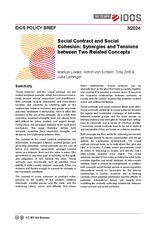Policy Brief
Social contract and social cohesion: synergies and tensions between two related concepts
Loewe, Markus / Armin von Schiller / Tina Zintl / Julia LeiningerPolicy Brief (3/2024)
Bonn: German Institute of Development and Sustainability (IDOS)
DOI: https://doi.org/10.23661/ipb3.2024
“Social cohesion” and the “social contract” are two related analytical concepts, which have become increasingly popular among researchers and practitioners. Both concepts help to understand and characterise societies and countries by shedding light on the relationships between members and groups of society and state institutions. Unfortunately, there is often little precision in the use of the concepts. As a result, their respective analytical strengths have not always been well utilised for policy analysis and project design. Furthermore, the synergies between them have been overlooked. This paper therefore defines both concepts, considers their respective strengths and discusses the relationship between them. The concept of the social contract emphasises the deliverables exchanged between societal groups and governing authorities. Social contracts are the sum of formal and informal agreements amongst societal actors and between them and the actor in power (the government or any other type of authority) on the rights and obligations of one towards the other. Social contracts vary enormously, but all establish more stability in state–society relations, especially if they are inclusive and flexible enough to account for changes in the framework conditions. The concept of social cohesion, in contrast, refers primarily to the quality of the relations between individuals, societal groups and the state, and the underlying values, norms and attitudes that shape these relationships. Social cohesion can be characterised as the glue that holds a society together and enables it to develop a shared vision. It concerns the horizontal relationships between members of society and the vertical relationships between societal actors and political institutions. Social contracts and social cohesion affect each other. Social contracts contribute to social cohesion because the regular and predictable exchange of deliverables between societal groups and the state creates an interdependence that strengthens mutual trust, willing-ness to cooperate and a sense of common identity. Conversely, social contracts tend to be more resilient and sustainable if they are based on cohesive societies. Both concepts are thus useful for national governments and foreign donors to assess opportunities and design policies for sustainable development. The social contract concept helps us to understand the “give and take” in a country: it shows where governments could do better in delivering to society and thereby make state–society relations more stable. The social cohesion concept in turn helps to determine what holds societies together and which attributes of intra-society relations could or should be strengthened. In addition, both concepts assist foreign donors in assessing which interventions would be favourable for the internal relationships in partner countries and in thinking carefully about potential unintended harmful effects. In particular, international donors can benefit from exploiting the mutually enforcing relationship between social contract and social cohesion.
Kontakt
Cornelia Hornschild
Koordinatorin Publikationen
E-Mail Cornelia.Hornschild@idos-research.de
Telefon +49 (0)228 94927-135
Fax +49 (0)228 94927-130
Alexandra Fante
Bibliothekarin/Open Access-Koordinatorin
E-Mail Alexandra.Fante@idos-research.de
Telefon +49 (0)228 94927-321
Fax +49 (0)228 94927-130







